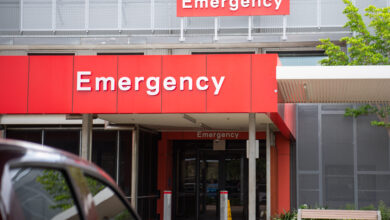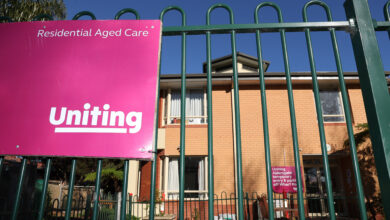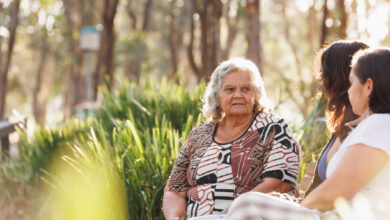Time’s up on the vaccine mandate: leaders weigh-in

Mandatory vaccinations for aged care staff are set to be enforced tomorrow, Friday 17 September, as union leaders address mounting concerns that over 13,000 staff are yet to receive their first jabs.
As of midnight, all aged care employees, including direct care workers, administration staff, and maintenance workers, must have had their first dose or risk their jobs.
As of Friday, 95.8 per cent of workers have received their first jabs and 76.9 per cent are fully vaccinated, according to the latest health department figures.
Any loss of staff during this period price that the sector cannot afford, said HSU president Gerard Hayes.
“We have a workforce crisis and there’s nothing being done about it," he said.
“My biggest concern is going back to the aged care royal commission, identifying the attraction and retention issues we are seeing at the moment in some aged care facilities.
“They are finding difficulty in getting agency staff, and we are seeing other facilities extending 8-hour shifts to 12-hour shifts.”
Despite critical staff shortages, aged care workers have come out in force since the national cabinet announced the vaccine mandate in July.
A recent Guardian analysis showed a rapid incline in workforce vaccinations over the past month, which has been aided by roving outreach clinics, dedicated vaccine hubs, and in-house jabs.
Hayes said that the government should extend the Friday deadline to avoid exacerbating any staff losses.
“We saw this with NSW health who had a deadline about a week or so ago, and they extended that due to the fact that they don’t have the reserves of people who are vaccinated,” he said.
“I think the same thing will have to happen ... the age care sector is much more complex than the public health setting.”
Unions and providers are now relying on the government to provide backup staff to fill out any gaps in the workforce in the coming weeks.
Aged Care Services Minister Richard Colbeck told Aged Care Insite that the Department of Health was contacting providers and facilities where vaccination rates were still low.
“Where there are more substantive issues, they are being case managed and additional vaccination teams are being mobilised this week,” he said.
“Contact with those providers has predominantly highlighted a lag in administrators uploading the latest information.
“We won’t expect to see the final figures logged and reported until next Wednesday.”
When asked about calls for an extension, Colbeck indicated that the government was set on enforcing the set deadline.
“The public health orders are clear, as they were for flu vaccinations last year, and we are confident facility administrators will manage staff as they have done previously.
“As the first sector to benefit from a national approach to mandatory vaccinations, the aged care workforce has stepped up to the plate and is showcasing extraordinary commitment and leadership as the vaccine rollout continues,” he said.
“The uptake in vaccinations has provided a blueprint for other sectors to follow.”
A final meeting between sector leaders and the government is expected to take place tomorrow to discuss what will occur after Friday, according to ANMF federal secretary Annie Butler.
There have also been calls for a national summit to develop a workforce plan for nurses, which is "incredibly urgent", according to ACN CEO, adjunct professor Kylie Ward.
Ward has plans to meet with the federal government this week to discuss the details.
Government 'dismally failed'
Labor’s shadow minister for health and ageing, Mark Butler, said that the federal government had “dismally failed” the vaccine rollout for the sector.
“Aged care is already desperately understaffed, and workers are overworked,” he said.
“We’ve heard stories of aged care nurses being pulled into the vaccination rollout and the international border closure has meant there is a limited supply of new aged care workers.
“Aged care cannot afford another failed promise by Scott Morrison. He needs to urgently outline a clear plan to guarantee continuity of care to older Australians.”
Since the beginning of the pandemic, aged care residents account for 63 per cent of COVID-related deaths in Australia.
As of Wednesday, there are currently 43 active outbreaks nationwide.
With most residents fully jabbed, virus transmissions have come largely from the outside, with the latest outbreak in a Sydney facility linked to an infected doctor.
ACSA’s new chief executive, Paul Sadler, said that most aged care workers are pro-vaccine and anticipates that this week’s figures will reach 100 per cent by Friday.
“If our workers had received the jab in their place of work earlier this year, as was originally planned, the vaccination program would have been completed by now,” he said.
“It's promising to see an increase in available vaccines and places for aged care workers to be vaccinated, the distribution must prioritise them.”
A commonwealth-led program, Sadler said, would be pivotal to reaching full coverage now that further vaccines have become available nationally.
“We urge the government to put in place additional measures to help workers and providers meet the deadline.
“The next priority will be assisting the home care workforce to be vaccinated, which is necessary to protect both workers and home care clients.”
The details
Every state and territory has now issued a public health order or a public health directive requiring COVID-19 vaccination as mandatory.
Compliance work will then be undertaken by the Health Department and the Aged Care Quality and Safety Commission in line with each jurisdiction's health order, according to Colbeck.
LASA chief Sean Rooney said there may be exemptions for those who can’t get jabbed in time.
“Under the State and Territory public health orders, temporary exemptions will be in place to ensure there is continuity of care, quality and safety for both the residents and the staff,” he said.
“We are actively monitoring progress to achieve vaccination and working in collaboration with the Government to ensure all the supports that are required to providers are given.”
Aged care workers were initially prioritised for the vaccine rollout in February, which the government said would be completed within six weeks.
Over eight months later, a lack of access to vaccines and widespread confusion have led to growing frustration from industry leaders, providers, workers and families.
In June, the ANMF sent a letter to the prime minister to clarify the details of the rollout, which went unanswered.
There have also been reports of unvaccinated agency staff entering facilities.
“We won’t know the full picture of what we are actually looking at until Friday, not even a few days later because the public health orders haven’t come all out at once and they haven’t been entirely consistent,” said Butler.
“Victoria’s only came out last week, so people were holding off not knowing exactly what the rules would be, so there’s going to be some delays."
Over the past year, peak bodies and unions, including the ANMF, have expressed anger over the 'smoke and mirrors' game played since the announcement of the mandate.
“We were very upset, and the reason we were upset was because the initial announcement seemed to be a political decision and not a health decision.
“Our view and the view of our members is that they were trying to shift the discussion and blame aged care workers.
“I would say that it’s because of the workforce themselves, unions and providers all working together to demand action from the government and working really solidly, is what has made this happen.”
Butler confirmed that the visitor's code in residential aged care is currently under review and that some individual providers are looking to mandate vaccinations for visitors and contractors.
“Those discussions are definitely starting to happen,” she said.
Email: [email protected]





